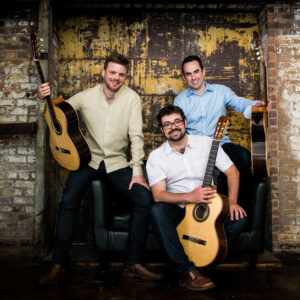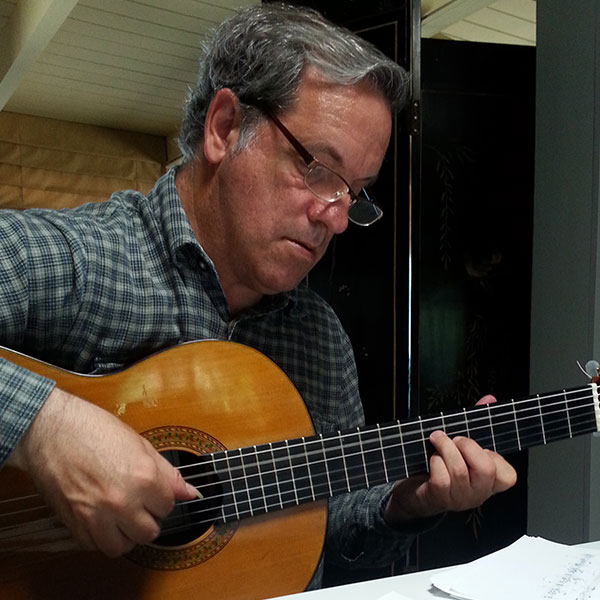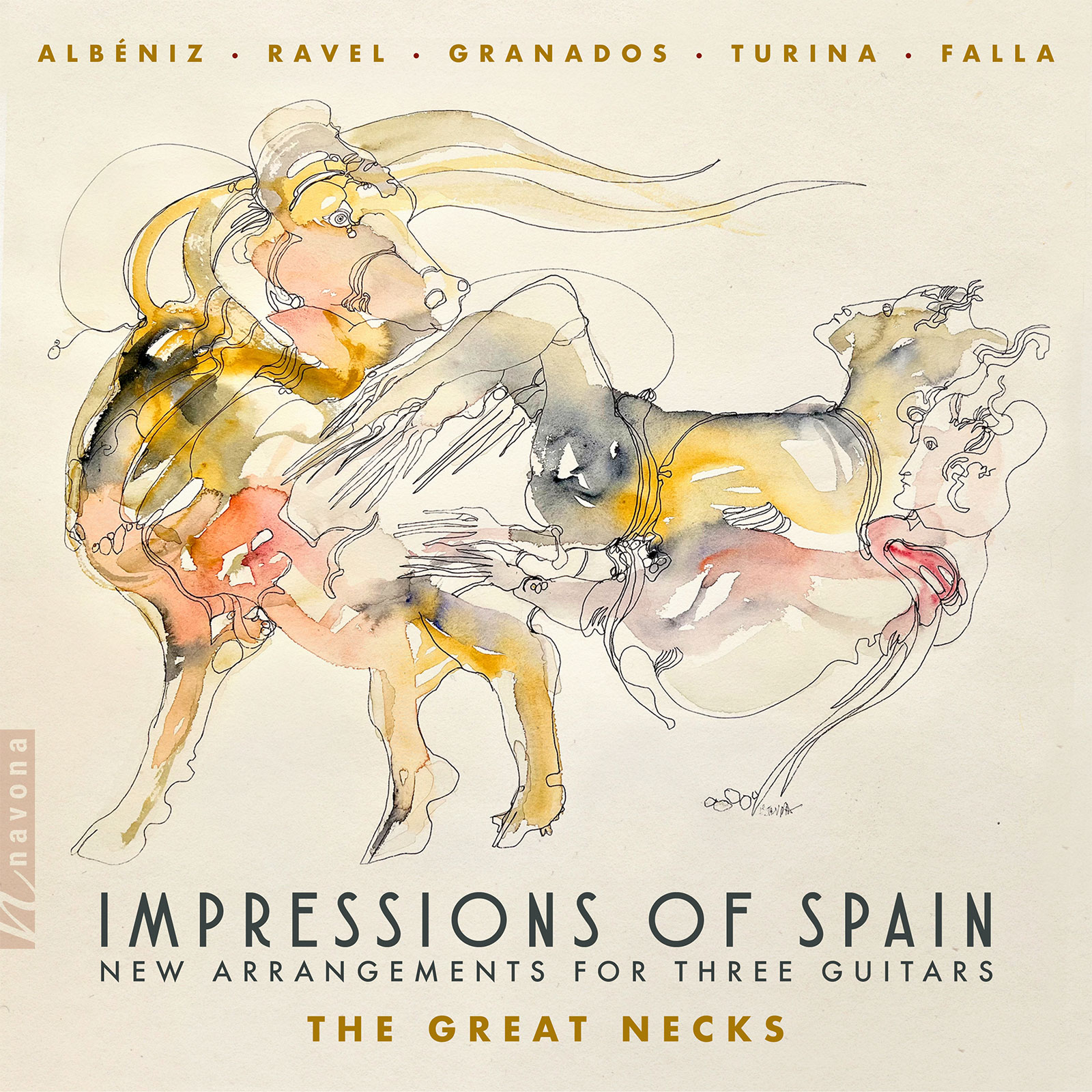Impressions of Spain
The Great Necks Guitar Trio
Isaac Albéniz composer
Maurice Ravel composer
Enrique Granados composer
Joaquín Turina composer
Manuel de Falla composer
On IMPRESSIONS OF SPAIN from Navona Records, the critically acclaimed guitar trio enchants and excites with their performance of Spanish-influenced works from master composers of the late 19th and early 20th centuries. Arranged and adapted for guitar trio by Gregg Nestor, the unexplored repertoire of five composers cascades across guitar frets in this recording, communicating themes of love, poetry and literature, spanish dance, and the spirit of Spain itself through music. Experience the works of Isaac Albéniz, Maurice Ravel, Enrique Granados, Joaquín Turina, and Manuel de Falla through a new and virtuosic voice.
Listen
Stream/Buy
Choose your platform
Track Listing & Credits
| # | Title | Composer | Performer | |
|---|---|---|---|---|
| 01 | Suite from The Magic Opal: Prelude | Isaac Albéniz, arr. Gregg Nestor | The Great Necks Guitar Trio | Adam Levin, Scott Borg, Matthew Rohde | 2:10 |
| 02 | Suite from The Magic Opal: Intermezzo | Isaac Albéniz, arr. Gregg Nestor | The Great Necks Guitar Trio | Adam Levin, Scott Borg, Matthew Rohde | 9:00 |
| 03 | Suite from The Magic Opal: Ballet | Isaac Albéniz, arr. Gregg Nestor | The Great Necks Guitar Trio | Adam Levin, Scott Borg, Matthew Rohde | 3:56 |
| 04 | Don Quichotte à Dulcinée: Chanson romanesque | Maurice Ravel, arr. Gregg Nestor | The Great Necks Guitar Trio | Adam Levin, Scott Borg, Matthew Rohde | 1:52 |
| 05 | Don Quichotte à Dulcinée: Chanson épique | Maurice Ravel, arr. Gregg Nestor | The Great Necks Guitar Trio | Adam Levin, Scott Borg, Matthew Rohde | 2:55 |
| 06 | Don Quichotte à Dulcinée: Chanson à boire | Maurice Ravel, arr. Gregg Nestor | The Great Necks Guitar Trio | Adam Levin, Scott Borg, Matthew Rohde | 1:42 |
| 07 | Cinco Pièzas Populares: Añoranza | Enrique Granados, arr. Gregg Nestor | The Great Necks Guitar Trio | Adam Levin, Scott Borg, Matthew Rohde | 2:57 |
| 08 | Cinco Pièzas Populares: Zambra | Enrique Granados, arr. Gregg Nestor | The Great Necks Guitar Trio | Adam Levin, Scott Borg, Matthew Rohde | 5:30 |
| 09 | Cinco Pièzas Populares: Zapateado | Enrique Granados, arr. Gregg Nestor | The Great Necks Guitar Trio | Adam Levin, Scott Borg, Matthew Rohde | 4:35 |
| 10 | Cinco Pièzas Populares: Moresque | Enrique Granados, arr. Gregg Nestor | The Great Necks Guitar Trio | Adam Levin, Scott Borg, Matthew Rohde | 3:51 |
| 11 | Cinco Pièzas Populares: Miel de la Alcarria | Enrique Granados, arr. Gregg Nestor | The Great Necks Guitar Trio | Adam Levin, Scott Borg, Matthew Rohde | 5:50 |
| 12 | Poema en forma de Canciones: Dedicatoria | Joaquín Turina, arr. Gregg Nestor | The Great Necks Guitar Trio | Adam Levin, Scott Borg, Matthew Rohde | 2:23 |
| 13 | Poema en forma de Canciones: Nunca olvida | Joaquín Turina, arr. Gregg Nestor | The Great Necks Guitar Trio | Adam Levin, Scott Borg, Matthew Rohde | 1:52 |
| 14 | Poema en forma de Canciones: Cantares | Joaquín Turina, arr. Gregg Nestor | The Great Necks Guitar Trio | Adam Levin, Scott Borg, Matthew Rohde | 1:40 |
| 15 | Poema en forma de Canciones: Los dos miedos | Joaquín Turina, arr. Gregg Nestor | The Great Necks Guitar Trio | Adam Levin, Scott Borg, Matthew Rohde | 2:58 |
| 16 | Poema en forma de Canciones: Las locas por amor | Joaquín Turina, arr. Gregg Nestor | The Great Necks Guitar Trio | Adam Levin, Scott Borg, Matthew Rohde | 1:14 |
| 17 | Cuatro Pièzas Españolas: Aragonesa | Manuel de Falla, arr. Gregg Nestor | The Great Necks Guitar Trio | Adam Levin, Scott Borg, Matthew Rohde | 3:13 |
| 18 | Cuatro Pièzas Españolas: Cubana | Manuel de Falla, arr. Gregg Nestor | The Great Necks Guitar Trio | Adam Levin, Scott Borg, Matthew Rohde | 3:55 |
| 19 | Cuatro Pièzas Españolas: Montañesa (Paysage) | Manuel de Falla, arr. Gregg Nestor | The Great Necks Guitar Trio | Adam Levin, Scott Borg, Matthew Rohde | 4:33 |
| 20 | Cuatro Pièzas Españolas: Andaluza | Manuel de Falla, arr. Gregg Nestor | The Great Necks Guitar Trio | Adam Levin, Scott Borg, Matthew Rohde | 4:02 |
Recorded June 6-10, 2021 at Futura Productions, Roslindale MA
Recording Session Producer Drew Henderson
Recording Session Engineer John Weston
All works were arranged for guitar trio by Gregg Nestor
Instruments by Stephan Connor, Dominique Field
Art by Oscar Estruga
www.oscarestruga.com
Executive Producer Bob Lord
Executive A&R Sam Renshaw
A&R Director Brandon MacNeil
A&R Jacob Smith
VP of Production Jan Košulič
Audio Director Lucas Paquette
VP, Design & Marketing Brett Picknell
Art Director Ryan Harrison
Design Edward A. Fleming, Morgan Hauber
Publicity Patrick Niland, Aidan Curran
Content Manager Sara Warner
Artist Information

The Great Necks Guitar Trio
The Great Necks Guitar Trio has enchanted audiences across the United States with its whimsical, interactive, and daring performances. Founded by guitarists Scott Borg, Adam Levin, and Matthew Rohde, the trio — through its original madcap arrangements — stretches at the conventions — and at times, the physical limits — of the guitar with what American Record Guide calls “some of the most inventive artistry you are likely to find in today’s guitar world.”

Gregg Nestor
Internationally-acclaimed guitarist Gregg Nestor has built a strong following for his abilities as soloist, accompanist, and arranger. A finalist in the 1981 New York Concert Guild Competition held at Carnegie Hall, Nestor has recorded and broadcast in Holland, Belgium, Spain, and for the BBC in London. In his London debut, The Times critic commented on his being “uncommonly communicative, a real artist in timing and shading, in stylish fluency and tact besides wholehearted communication with his composers.”
Notes

The Great Necks Guitar Trio
This recording focuses on five of the great pillars of late 19th and early 20th century Spanish (or, in Ravel’s case, Spanish influenced) composers. Even if all five composers are well-known to guitarists, the specific works here are not. As an arranger, I found it particularly exciting not to revisit old favorites but instead to expand the guitar trio repertoire with these underappreciated gems. This recording is novel in another important way. While the trio was recorded over several intensive days at Futura Productions in Roslindale, Massachusetts under the direction of engineer John Weston, it was produced – and ultimately edited and mastered – remotely by Drew Henderson and myself, in Toronto and Los Angeles, respectively. This wouldn’t have been possible without state of the art streaming technology.
Through and through, the collaboration – for all its complexities – was a thrilling one. I am thrilled to share it with you here.
— Gregg Nestor
January 25, 2022
Glendale, California
These trio guitar arrangements were commissioned, premiered, and recorded by The Great Necks Guitar Trio.

